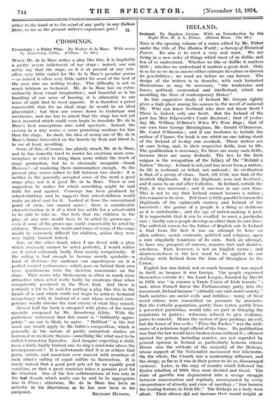CROSSINGS..
Crossings : a Fairy Play. By Walter do la Mare. With music
WIIEN Mr. de la Mare writes a play like this, it is implicitly a pretty severe indictment of our stage : indeed, one can safely say that the stage, as it is at present at any rate offers very little outlet for Mr. de la Mare's peculiar genius —as indeed it offers very little outlet for most of the best of the men who are writing to-day. This difficulty is not so much intrinsic as technical. Mr. de la Mare has an extra- ordinarily keen visual imagination ; and beautiful as is his handling of our sense of hearing, it is ultimately to our sense of sight that he most appeals. It is therefore a priori conceivable that for an ideal stage he would be an ideal playwright ; but then one comes down to technique and mechanics, and one has to admit that the stage has not yet been invented which could even begin to translate Mr. de la Mare's best conceptions into solid spectacle. Indeed, the cinema in a way seems a more promising medium for him than the stage. In short, the idea of seeing one of Mr. de la Mare's fairies travestied on the boards by flesh and blood is, to me at least, revolting.
Some of this, of course, has plainly struck Mr. de la Mare, and he has honestly tried to render his creations more com- monplace in order to bring them more within the reach of stage production, but he is obviously incapable—thank Heaven !—of rendering them commonplace enough. So the present play seems rather to fall between two stools : it is neither in the generally accepted sense of the word a good stage play, nor is it good Mr. de la Mare. There is one suggestion he makes for which something might be said both for and against. Crossings has been produced by school-children, and he suggests that school-children would make an ideal cast for it. Looked at from the conventional point of view, one cannot agree : there is considerable characterization in it of a kind too subtle for a school-child to be able to take- in. One feels that the children in the play, at any rate, would have to be acted by grown-ups— even if sonic of the grown-ups could conceivably be acted by children. Moreover, the words and tunes of many of the songs would he extremely difficult for children, unless they were very highly trained indeed.
But, on the other hand, when I am faced with a play which obviously cannot be acted perfectly, I would rather see it acted extremely badly than merely competently. If the acting is bad enough to become merely symbolic—a kind of skeleton—the audience can superimpose on it a perfect mental performance, which goes on behind their own eyes, synchronous with the skeleton mnemonics on the stage. That seems why Shakespeare is often so much more attractive when acted really badly by amateurs than when competently produced in the West End. And there is certainly a lot to be said for putting a play like this in the hands of a cast which could not begin to achieve technical competency with it, instead of a cast whose technical corri= petency would obscure the vast extent of what they missed.
Almost half the book is occupied with plates of the music specially composed by Mr. Armstrong Gibbs. With the publishers' statement that this music is " brilliantly appro- priate " no one is likely to agree. " Brilliant " is the last word one would apply to Mr. Gibbs's composition, which is generally in the nature of pretty competent studies on borrowed or mediocre themes—something like what used to be called Connecting Episodes. And imagine expecting a child, even a fairly highly trained one, to sing a semi-tone above the accompaniment I It is unfortunate that it is so seldom that poets, artists, and musicians ever consort with members of each other's calling of equal calibre to themselves. It is rarely indeed that a good poet gets set by an equally good musician, or that a great musician takes a genuine poet for his librettist. One of the few collaborations of two arts in the last decade which really can be said to be appropriate was in Flora : otherwise, Mr. de la Mare has been as unlucky in his illustrators as he has now been in his composer.
RICHARD HUGHES.










































 Previous page
Previous page